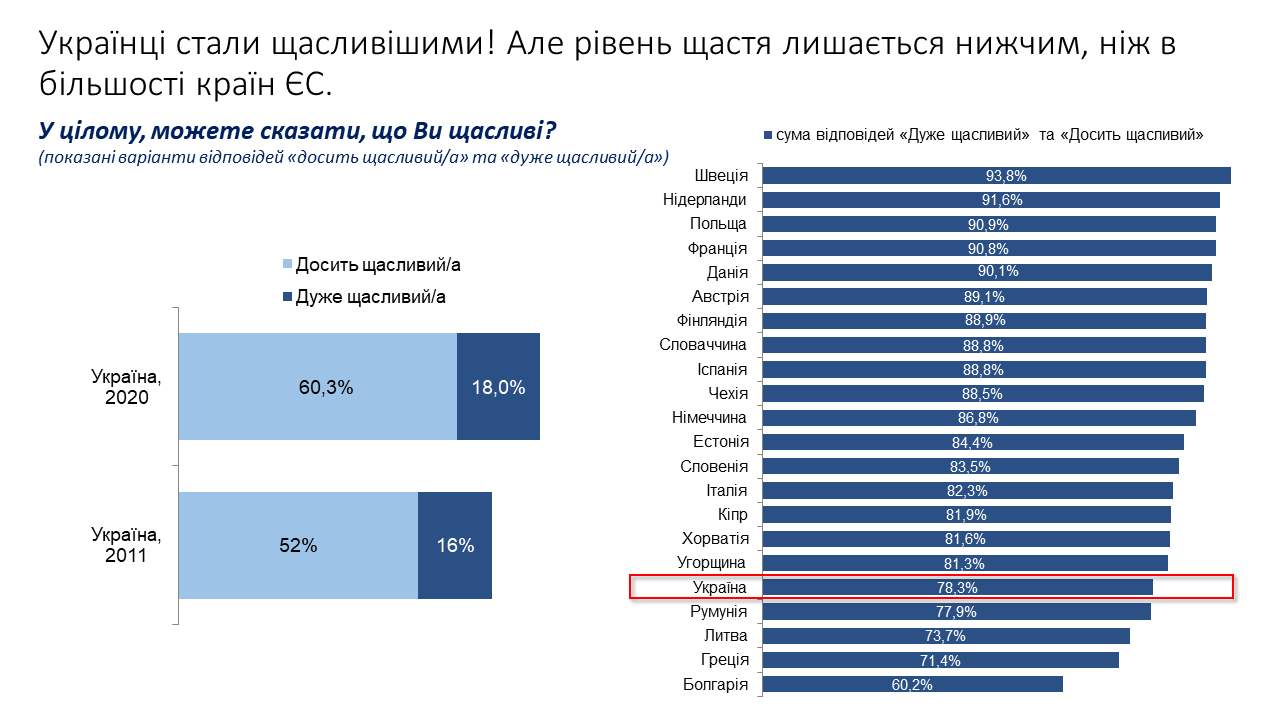According to R. Inglehart, survival has been the priority for humanity throughout most of history, and this has kept current the values of group solidarity, traditionalism, rejection of otherness and submission to strong leaders. Modernization, economic development and security, established in many countries after the Second World War, led to a movement towards secular and rational values and values of self-expression: reducing the influence of religion and authoritarian leaders, spreading democracy, tolerance, gender equality, etc. All of these in turn contributes to economic growth, as well as to the increase in the level of happiness. According to the seventh wave of the study, secular-rational values and values of self-expression are present in such countries as Sweden, Norway and Denmark the most. They are among the most economically developed and happiest countries.
In nine years since the sixth wave of the World Values Survey in Ukraine, the Revolution of Dignity and the occupation of part of Donbass and the Autonomous Republic of Crimea have taken place; there are ongoing hostilities in Donbass during the preparation of this report. Therefore, the sample of 2020 is not fully comparable with the sample of WVS 2011 and previous waves due to the invasion of territories, where about 6.5 million people lived (approximately 14% of the population of Ukraine). So, the dynamics reflect not only social changes, but also failure to take into account the population of the occupied territories in the sample. As a result of the war, there has been a significant decline in incomes of the population and the migration of more than a million internally displaced persons (IDPs) to the government-controlled areas (in 2020, IDPs were interviewed along with the general population). In 2020, in March-May, there was a lockdown due to the COVID-19 epidemic, due to which many Ukrainians lost their jobs or part of their income. And yet, despite all these shocks, according to the seventh wave of the WVS, in 2020 Ukrainians feel more secure, including financially, and happier than 9 years ago. In addition, most trends indicate a movement towards secular-rational values and values of selfexpression.
However, the values and cultural field of Ukrainian society is characterized by a contradictory and very slow shift from post-Soviet orientations in the areas of state and political system development, economy, interpersonal relations, legal sphere and so on. Ukraine has clearly declared a European path of development, but, according to empirical data of 2020 compared to the results of most EU countries, the value-regulatory system is one of the barriers in this direction.
The following trends indicate movement towards meeting basic needs and building a democratic state, as well as the growing prevalence of secular and rational values and values of self-expression1 compared to 2011:
- – Increase in the share of happy people from 68% to 78.3%;
- – Increase in the proportion of people in good health according to selfassessment, from 37% to 45.4%. The share of those who have never been without the necessary medication or medical care over the past year has increased from 53% to 62.5%;
- – Decrease in the share of those who are dissatisfied with the financial situation from 48% to 38.9%. There is also a decrease in the share of those who think that they have a low-income 1) Based on some of these issues, R. Inglehart and K. Wenzel developed a “Cultural Map of the World”. Other issues were categorized as secular-rational values and values of self-expression according to the interpretation of the report authors team. 78 level (from 55% to 45.1%), and there is an increase in the share of those who estimate their income as average (from 33% to 37%). The share of those who have never eaten poorly or stayed without food over the past year, has increased from 52% to 71.7%. Together with the growth in income estimates, Ukrainians began to rely less on the state and rely on themselves. So, there is an increase in the support for the statement “there should be greater incentives for individual effort” (as opposed to “incomes should be made more equal”), “people should take more responsibility to provide for themselves” (as opposed to “government should take more responsibility to ensure that everyone is provided for”), “private ownership of business and industry should be increased” (as opposed to “government ownership of business and industry should be increased”);
- – Increase in the share of those who have never felt in danger in their house/apartment over the past year, from 69% to 73.8%;
- – Decrease in the share of people who frequently encounter alcohol consumption in the streets, from 51.2% to 39.2% (however, the increase in the number of people who frequently encounter drug sale in streets from 9.9% to 13.4%, is alarming);
- – Decrease in the share of those who consider God important in their lives from 64% to 56.3%. At the same time, this may indicate a decrease in spirituality, rather than the impact of religion on life. So, the share of those who pray several times a week or more often, has decreased from 42.2% to 38.5%, but the share of those who attend religious services not less than once a month has increased from 24.1% to 33.5%. There is also an increase in the share of those who believe that the main meaning of religion is to follow religious norms and ceremonies (from 16.3% to 22.6%), and not to do good to people;
- – Decrease in the share of those who believe that children must be encouraged to learn religious faith (from 22% to 14.9%), as well as obedience (from 42% to 33.1%). There is an increase in the share of those who believe that children must be encouraged to learn determination, from 39% to 45.8%;
- – Increase in tolerance to people who have HIV (the share of those who would not want to live next door to them decreased from 52% to 36.4%) and to homosexuals (the corresponding share decreased from 62% to 44.8%);
- – Increase in tolerance to abortion (the share of answers “justifiable” has increased from 15.1% to 21.0%);
- – Decrease in the share of those who positively assess the growth of respect for government (from 50% to 31.9%);
- – Increase in the share of those who prefer “giving people more say in important government decisions” over fighting rising prices and maintaining order in the nation among the country’s priorities (from 18.4% to 23.8%);
- – Increase in public activity both actual and potential: increase in frequency of signing petitions, participation in nongovernmental organizations, readiness to attend demonstrations, strikes, boycotts;
- – Increase in the share of those who believe that the majority of people can be trusted: from 23.1% to 30.1%;
- – Increase in the share of those who believe that it is important to live in a democratic country, that Ukraine is governed democratically and that human rights are respected in it. 79;
- – Increase in the share of the respondents who believe that votes are counted fairly during the elections, from 30% to 54.4%;
- – Increase in the share of the respondents who do not agree that men are better political leaders than women (from 48% to 55.1%).

In general, R. Inglehart interprets the growing share of those who are proud of their citizenship as a growing tendency towards traditional values, but the authors of the report suggest that for post-colonial countries (since Ukraine has been under the influence of other states for most of recent history) this may not indicate a return of traditionalism, but the strengthening of statehood. It may also indicate a strengthening of solidarity during the war along with patriotism, the share of citizens willing to defend their country has increased from 40% to 56.9%. If 67% were proud of Ukrainian citizenship in 2011 (26% were very proud, and 41% were rather proud), then there are already 82.2% in 2020 (34.7% - “very proud” and 47.5% - “rather proud”). In 2011, this figure in Ukraine was lower than in most EU countries, while now it roughly corresponds to the average level of those EU countries for which data from the seventh wave of the survey are available.
When comparing Ukraine with other countries, it remains the closest to the group of European Orthodox countries such as Bulgaria and Romania. At the same time, Ukraine outruns these countries by many indicators of secular and rational values and values of self-expression.
Unfortunately, there are also rather negative changes for democratic development, which may indicate the strengthening of certain aspects of traditional and survival values:
- – Decrease in the share of those who believe that independence need to be nurtured in one’s own children, from 43% to 35%;
- – Increase in xenophobia. The share of those who do not want to live next door to immigrants has increased from 19% to 27.1%, next door to people of other nationalities – from 17% to 24.8%;
- – Increase in the prevalence of gender stereotypes that university education is more important for boys than for girls, from 18% to 24.5%; that “if a woman earns more money than her husband, it’s almost certain to cause problems” - from 20% to 30.9%;
- – Decrease in the frequency of condemnation of situations where a man beats his wife, parents beat children, violence in general;
- – Decrease in the frequency of condemnation of receiving state aid, to which a person is not entitled, robberies, tax evasions, and receiving bribes;
- – Decrease in the share of those who support the fact that “not the government, but independent experts make decisions based on what they consider the best for the country”, from 65% to 46.2%;
- – Increase in the share of those who support army rule in the country, from 13% to 21.1%;
- – Decrease in the trust in most state institutions (courts, government, Verkhovna Rada, educational institutions, state institutions and services in general) – except for the Armed Forces and the National Police, the trust in which has increased. Confidence in NGOs and big business has also decreased;
- – Decrease in the readiness to vote both in the elections to the Verkhovna Rada (from 62% of those who always voted, to 55%) and in local elections (from 61% to 50.8%, respectively).
However, there are many more positive changes than negative ones, which reflects the development of Ukraine and the gradual adoption of secular-rational values and the values of self-expression.
The results obtained according to the results of the survey within the 7th wave of WVS, provide an opportunity to understand the place of Ukraine in the value and cultural dimension at the present stage both in Europe and in the world. This provides us with an understanding of the areas of consistent formation of values based on the system of European values, in particular, equality before the law, self-fulfillment, tolerance, openness to changes, individual responsibility and mutual assistance.
